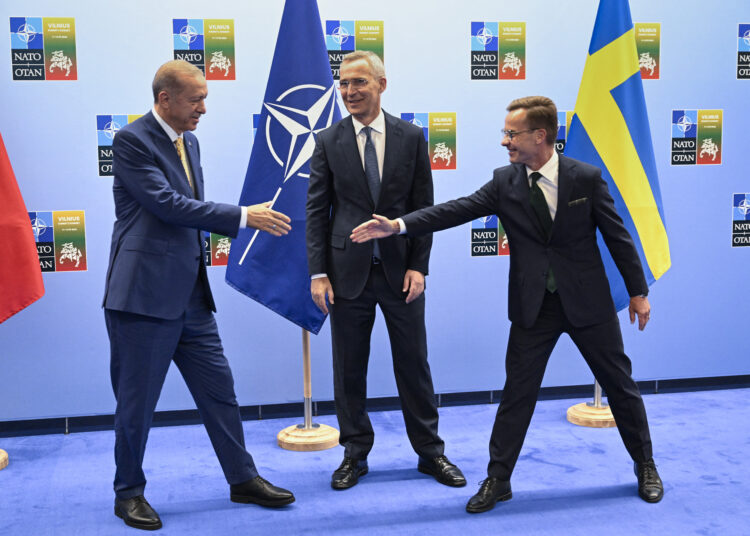Levent Kenez/Stockholm
Ankara appears to be signaling that it will not implement a special expedited procedure for the approval of Sweden’s NATO membership, unlike it did in the case of Finland, even though the agreement has been sent to parliament for approval. Turkish President Recep Tayyip Erdogan’s latest perceived delay in approving Sweden’s membership is seen as a response to being sidelined by the US in the Israel-Hamas conflict.
President Erdogan, during his return trip from Kazakhstan on Saturday, discussed the government’s role in initiating the parliamentary process, stating, “Our primary duty was to present this matter to parliament, and we’ve done just that. Our party and partners will continue their efforts within the parliament. NATO Secretary-General Jens Stoltenberg recently expressed his appreciation, recognizing my decision to bring this issue to parliament as a positive step. In response, I said the parliament would play a crucial role in deciding the way forward. Like the United States has its House of Representatives and Senate, we have our own parliament. It will be the task of our parliament to deliberate on this matter.”
He also said it’s currently budget season and that the parliament is focused on budget-related discussions. However, President Erdogan expressed a commitment to simplifying the Swedish approval process as much as possible as long as there’s a positive approach from all involved parties, referring to Sweden and indirectly to the United States.
Erdogan’s recent comments suggesting uncertainty about the Swedish approval process in parliament may not accurately reflect the situation. Earlier this year, Finland’s NATO application was quickly approved, largely due to Erdogan’s party and its allies holding a majority in parliament. The conversion of a proposal into law in just 15 days is a rare occurrence in Turkish parliamentary procedure.
In the case of Finland’s NATO application, Erdogan submitted the proposal to parliament for approval on March 17. The Office of the Speaker then referred it to the Foreign Affairs Committee three days later. The committee promptly convened and approved the proposal in three more days, after which it was sent to the General Assembly for a vote. The vote occurred on March 31, the final working day of parliament before the May elections, and it received approval with 276 votes in favor, with all members present voting “yes.” Finland’s application was officially ratified by Turkey, with Erdogan signing it into law and its publication in the Official Gazette on April 1.
Political observers suggest that Ankara is unhappy with the fact that following the conflict that began on October 7 between Israel and Hamas, US President Joe Biden did not have a phone conversation with President Erdogan and that US Secretary of State Antony Blinken initially visited several regional countries but did not come to Turkey. In the early days of the conflict, Erdogan called for restraint from both sides and took a different approach compared to his previous strong statements about Israel. However, when this approach didn’t receive the expected attention, he later made strong remarks regarding Israel’s operations targeting civilians and described Hamas as a liberation group waging a battle to protect its lands and people, not a terrorist group. Erdogan’s plan to delay the approval process for Sweden’s membership in NATO, with the aim of becoming a relevant party again, aligns with his past tactics of creating crises to attract attention.
On November 1, Fuat Oktay, chairman of the Turkish parliament’s Foreign Affairs Committee and the country’s former vice president, addressed the ongoing debate surrounding Sweden’s potential NATO membership at a committee meeting. Oktay reiterated his stance, explaining, “As the Foreign Affairs Committee, we have our own agenda and a set of internal procedures to follow. Hence, within the confines of this procedure and within our own agenda, Sweden’s NATO membership will be deliberated on at the appropriate time. The Sweden agreement along with other international agreements are on our list of priorities. Consequently, we will evaluate them in line with our specific preferences.”
Minutes of the committee meeting:
Oktay then added: “’But it’s very urgent.’ When someone says that, what is urgent for you doesn’t have to be urgent for our committee or our parliament because what is urgent for us may not be urgent for your committees or parliaments as well. You act according to your agenda, which is normal, and we will establish the necessary order and evaluate it according to our agenda.”
Nordic Monitor previously reported that President Erdogan sent a justification text to the legislature, outlining Sweden’s contributions to NATO. The document emphasizes Sweden and Finland’s status as NATO’s closest partners and their interoperability with the alliance. It details how Sweden’s commitment to fulfilling outlined commitments and supporting Turkey’s interests led to the approval of its NATO membership, emphasizing its positive impact on European-Atlantic security, including that of Turkey.
Meanwhile, US Secretary of State Blinken, who was expected to visit Turkey earlier, expressed confidence that progress would be made on Sweden’s NATO membership bid following talks with his Turkish counterpart in Ankara on Monday. Blinken said he was convinced that Turkey would support Sweden’s NATO membership and highlighted a shared commitment by Ankara and Washington to facilitate Sweden’s accession to the alliance.












